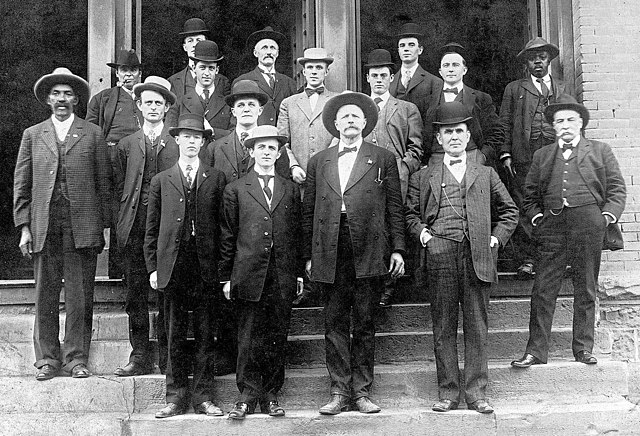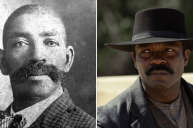Bass Reeves, the legendary Wild West figure who became the first black lawman West of the Mississippi, was known for his stellar track record of enforcing the law in the late 1800s and early 1900s. Today, his great-great-great-grandson is also an enforcer -- albeit a different kind. Ryan Reaves, whose grandfather changed the family name slightly by trading the second "e" for an "a," is an enforcer in the National Hockey League, a position that involves intimidating opponents and defending teammates through a highly physical playstyle. NHL enforcers will also start a fight with an opponent that becomes too aggressive.
Videos by Wide Open Country
"My dad traced our family back to Bass Reeves," said Reaves, who is currently the right winger for the Toronto Maple Leafs. "That's pretty cool to learn where you come from."
Bass, the inspiration for the upcoming Paramount+ series "Lawmen: Bass Reeves," reportedly arrested thousands of outlaws and was known for protecting the African-American community at a time when it was especially vulnerable.
Bass Reeves: The Trailblazing Lawman

"Federal Official Family" pictured, with Bass Reeves at left (Photo from Wikimedia Commons/Public Domain)
Bass Reeves was born in July 1838 in Crawford County, Arkansas, into a life of bondage. He and his family were owned by William Steele Reeves, a prominent Arkansas state legislator. When the American Civil War broke out, George Reeves, William's son, joined the Confederate Army, taking Bass with him. The circumstances surrounding Bass Reeves' escape to freedom remain unclear, but it is believed that he gained his freedom during the Civil War, possibly by fleeing to the Indian Territory and living among Native American tribes.
After the Civil War and the abolition of slavery in 1865, Reeves returned to Arkansas and began farming near Van Buren as a freedman. However, his life was about to take a dramatic turn. In 1875, Isaac Parker, a federal judge for the Indian Territory, appointed James F. Fagan as U.S. Marshal and tasked him with hiring 200 deputy U.S. marshals. Fagan recruited Bass Reeves, recognizing his knowledge of the Territory and ability to speak several Native languages.
Reeves made history as the first black deputy U.S. marshal west of the Mississippi River. His jurisdiction covered the Western District of Arkansas and the Native reservation Territory. Over his 32-year career, Reeves became one of Judge Parker's most valued deputies, known for bringing in some of the most dangerous fugitives of the time. Despite having his hat and belt shot off on separate occasions, Reeves was never wounded. He displayed exceptional marksmanship with both rifles and revolvers and developed impressive detective skills.
During his tenure, Reeves arrested thousands of felons, and according to some accounts, he killed 14 outlaws in self-defense. In a heartbreaking twist, he even had to arrest his own son, Benjamin, for murder. Regardless of the personal pain it must have caused, Reeves insisted on bringing his son to justice. Benjamin served time in Fort Leavenworth in Kansas before turning his life around as a model citizen.
When Oklahoma became a state in 1907, Reeves joined the Muskogee Police Department at the age of 68 and served for two years before retiring due to declining health. He passed away on January 12, 1910, from Bright's disease (nephritis), leaving behind a legacy of fearlessness, integrity, and unwavering dedication to upholding the law.
Ryan Reaves: The Hockey Enforcer

Claus Andersen/Getty Images
Fast forward to the modern era, and we encounter another Reaves who embodies the spirit of an enforcer, albeit in a vastly different context. Ryan Reaves, born on January 20, 1987, in Winnipeg, Canada, is a professional ice hockey right winger who has played for several NHL teams, including the Minnesota Wild, St. Louis Blues, Pittsburgh Penguins, Vegas Golden Knights, and New York Rangers.
Reaves' reputation in the NHL is that of an enforcer—a player known for his physical play, fighting skills, and the ability to protect his teammates while intimidating the opposition. While his primary role is enforcing the unwritten code of conduct in hockey, he is also valued for his aggressive forechecking and checking line abilities.
Throughout his career, Reaves has had his fair share of run-ins with the NHL Department of Player Safety, which has resulted in suspensions and fines. Notably, in the 2021 Stanley Cup playoffs, he received a match penalty for an incident involving Colorado Avalanche's Ryan Graves, which led to a two-game suspension. His style of play often toes the line between physicality and discipline, making him a polarizing figure in the league.
Ryan Reaves' family background is rich with athletic talent. His father, Willard Reaves, was a professional football player who excelled in both the Canadian Football League (CFL) and the National Football League (NFL). Ryan's brother, Jordan Reaves, also pursued a career in football, playing for the Edmonton Elks. This athletic lineage showcases the family's commitment to sports.
Bass Reeves and Ryan Reaves, though living in different centuries and pursuing vastly different careers, share a common thread of being enforcers. While Bass enforced the law in the untamed American West and Ryan enforces the ice of Scotiabank Arena, each man is known for his intimidating presence and his ability to get the job done in high-pressure situations.




